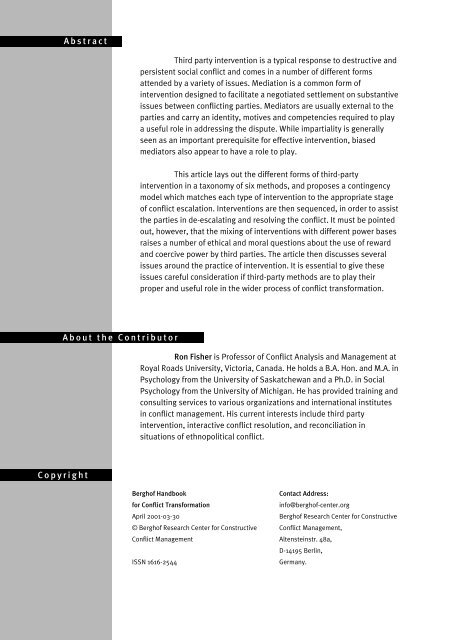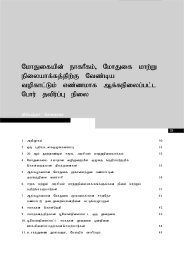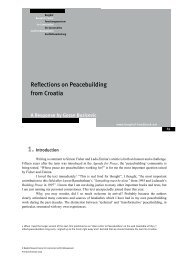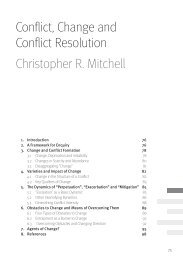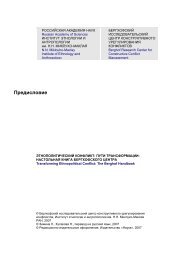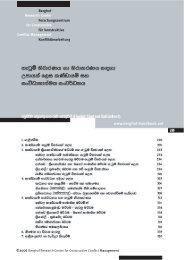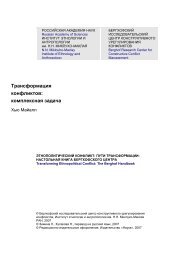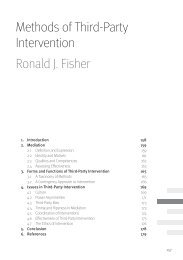Methods of Third-Party Intervention - Berghof Handbook for Conflict ...
Methods of Third-Party Intervention - Berghof Handbook for Conflict ...
Methods of Third-Party Intervention - Berghof Handbook for Conflict ...
Create successful ePaper yourself
Turn your PDF publications into a flip-book with our unique Google optimized e-Paper software.
Abstract<br />
About the Contributor<br />
Copyright<br />
<strong>Third</strong> party intervention is a typical response to destructive and<br />
persistent social conflict and comes in a number <strong>of</strong> different <strong>for</strong>ms<br />
attended by a variety <strong>of</strong> issues. Mediation is a common <strong>for</strong>m <strong>of</strong><br />
intervention designed to facilitate a negotiated settlement on substantive<br />
issues between conflicting parties. Mediators are usually external to the<br />
parties and carry an identity, motives and competencies required to play<br />
a useful role in addressing the dispute. While impartiality is generally<br />
seen as an important prerequisite <strong>for</strong> effective intervention, biased<br />
mediators also appear to have a role to play.<br />
This article lays out the different <strong>for</strong>ms <strong>of</strong> third-party<br />
intervention in a taxonomy <strong>of</strong> six methods, and proposes a contingency<br />
model which matches each type <strong>of</strong> intervention to the appropriate stage<br />
<strong>of</strong> conflict escalation. <strong>Intervention</strong>s are then sequenced, in order to assist<br />
the parties in de-escalating and resolving the conflict. It must be pointed<br />
out, however, that the mixing <strong>of</strong> interventions with different power bases<br />
raises a number <strong>of</strong> ethical and moral questions about the use <strong>of</strong> reward<br />
and coercive power by third parties. The article then discusses several<br />
issues around the practice <strong>of</strong> intervention. It is essential to give these<br />
issues careful consideration if third-party methods are to play their<br />
proper and useful role in the wider process <strong>of</strong> conflict trans<strong>for</strong>mation.<br />
Ron Fisher is Pr<strong>of</strong>essor <strong>of</strong> <strong>Conflict</strong> Analysis and Management at<br />
Royal Roads University, Victoria, Canada. He holds a B.A. Hon. and M.A. in<br />
Psychology from the University <strong>of</strong> Saskatchewan and a Ph.D. in Social<br />
Psychology from the University <strong>of</strong> Michigan. He has provided training and<br />
consulting services to various organizations and international institutes<br />
in conflict management. His current interests include third party<br />
intervention, interactive conflict resolution, and reconciliation in<br />
situations <strong>of</strong> ethnopolitical conflict.<br />
Bergh<strong>of</strong> <strong>Handbook</strong><br />
<strong>for</strong> <strong>Conflict</strong> Trans<strong>for</strong>mation<br />
April 2001-03-30<br />
© Bergh<strong>of</strong> Research Center <strong>for</strong> Constructive<br />
<strong>Conflict</strong> Management<br />
ISSN 1616-2544<br />
Contact Address:<br />
info@bergh<strong>of</strong>-center.org<br />
Bergh<strong>of</strong> Research Center <strong>for</strong> Constructive<br />
<strong>Conflict</strong> Management,<br />
Altensteinstr. 48a,<br />
D-14195 Berlin,<br />
Germany.


